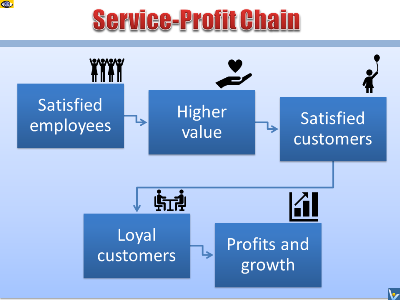|
 |
|
The service-profit chain is a powerful
phenomenon that stresses the importance of people – both employees
and customers – and how linking them can leverage corporate
performance. The service-profit chain is an
equation that establishes the relationship between corporate
policies, employee satisfaction,
value creation, customer loyalty, and
profitability. |
|
 |
The more you care about your team,
the more the team will care about you and their customers. |
Jack Ma |
| |
Seamless Integration
A seamless integration of all components in the service-profit chain –
employee satisfaction,
value creation,
customer satisfaction,
customer loyalty, and
profit and
growth – links all the critical dynamics of top customer service,
helps approach customer relationships
holistically and create
dynamic synergy with customers.
The
company
inspires, guides, nurtures,
develops, and
empowers its employees, and the employees do their best to secure great
customer experience so that the company could harvest the benefits that
accrue from it.
|
|
People Power
Benefits of Empowerment
Customer Experience
Love Story
CX Management
Customer Feedback
Sustainable Competitive
Advantage
Sources
|
|
| |
Why Service-Profit Chain?
"It's People, Service, Profit, not Profit, Service, People."
~ Fred Smith
Many companies
fail to leverage the service-profit chain.
It is estimated that two-thirds of customers who defect do so because of
poor service. In order for customer service to drive profits, every link in
your service-profit chain – employee capability,
job satisfaction,
productivity, employee loyalty and
customer satisfaction – must be strong.
Sustainable Profit Growth
There is a straight line between happy employees and happy customers,
between superior customer service and
sustainable
profit growth. Delivering top quality service must be brought to the top of
your company's needs hierarchy as one can draw a straight line between
superior service and your sustainable profit growth. To achieve success, you
must make superior service second nature of your organization.
|
Employee Performance
Harness Your People
Right Fit
Customer-focused Culture
Deep Customer Focus
Customer Experience
CX as a Love Story
CX Management
Customer Loyalty
Customer Satisfaction
|
|
|
The GE Leadership
Effectiveness Survey (LES)
|
|
|
|
The Fun Factor
Why would people want buy from you if they
don't enjoy
doing so? Making what you have to sell fun to buy is simply taking the whole
process one step further. "If you can make your customers laugh, and excite
them with your vision of what life can be, they are not going to walk
into your outlets, but run into them. Running a successful business
should be fun for
you, and there's every reason why you should be able to communicate that
sense of fun to your customers. Certainly, if you aren't having fun, you
probably aren't running a successful business."5...
More
Satisfying
Your Customers
Customer satisfaction is a critical component of your
sustainable profitability and growth. To make make customer service an
essential part of your corporate culture and produce empowered and motivated
employees who are committed to ever higher standards of customer service and
satisfaction you must demonstrate continuously that in your company's order
of priorities, customer service comes before all else. You must develop a
system for collecting customer satisfaction data and relaying this
information to those responsible for
value creation, and develop a system that rewards people for building
and maintaining customer relationships...
More
80/20 Theory
of Effective Selling and Competing
80/20 Principle helps you to direct your attention where the real threat
of competition exists. 80% of your revenue comes from 20% of your customers.
Know who your top revenue-producing customers are and make sure you meet
their needs to win their loyalty. "Focusing on 20% of your customers is a
great deal easier than focusing on 100% of them." Being customer centered on
all your customers is impossible. "But cherishing the core 20% is both
feasible and highly rewarding."6...
More |
|
References:
-
"Extreme Management", Mark Stevens
-
"Motivate to Win", Richard Denny
-
"The Basics of Leadership", Merlin Ricklefs
-
"Exceptional Customer Service", Lisa Ford, David McNair, and Bill Perry
-
"The Seven Deadly Skills of Competing", James Essinger & Helen Wylie
-
"The 80/20 Principle", Richard Koch
|
|
|